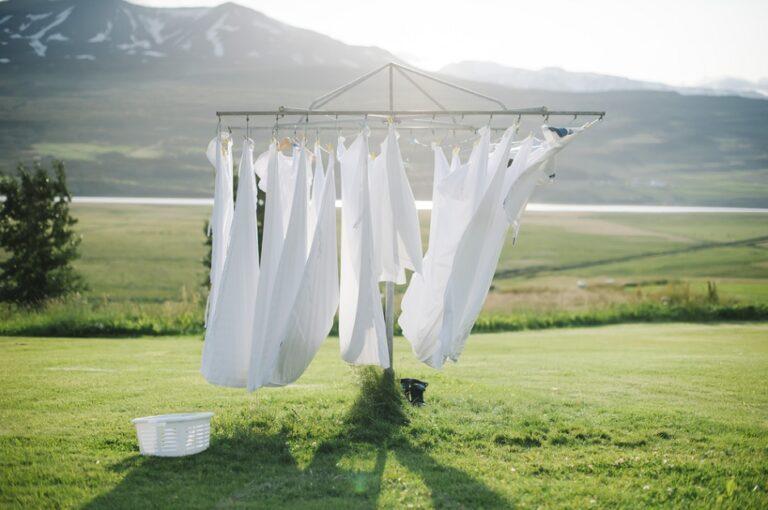
When it comes to maintaining your wardrobe, the choice between Bloomington dry cleaners and washing at home can make a significant difference in fabric care, cost, convenience, and environmental impact. Let’s delve into these factors to help you make an informed decision.
Understanding Fabric Care: Protecting Various Fabric Types
One of the most critical considerations is how each method handles different types of fabrics. Dry cleaning and home washing offer distinct advantages and drawbacks depending on the material.
Dry Cleaning:
-
Delicate Fabrics: Dry cleaning is the preferred method for delicate fabrics like silk, wool, and rayon. These materials can be easily damaged by water, which can cause shrinkage, color fading, and fabric distortion. The solvents used in dry cleaning, however, gently remove dirt and stains without affecting the fabric’s structure.
-
Stain Removal: Professional dry cleaners have specialized treatments for tough stains that household detergents might not remove effectively. For instance, oil-based stains, which are particularly challenging to clean at home, can be more effectively treated with the solvents used in dry cleaning.
-
Fabric Longevity: Regular dry cleaning can extend the life of garments by maintaining their original texture and appearance. This is especially important for investment pieces like suits, formal wear, and designer items.
Home Washing:
-
Everyday Fabrics: Cotton, polyester, and blends are typically well-suited for home washing. These fabrics can withstand the mechanical action of a washing machine and the detergents used. Modern washing machines also offer gentle cycles that can accommodate some delicate items, but it’s crucial to follow the care labels to avoid damage.
-
Accessibility: Home washing allows you to clean clothes more frequently, which is convenient for everyday wear. This means you can keep a regular rotation of clean clothes without the need to wait for dry cleaning services.
Transitioning from fabric care, another essential aspect to consider is the cost involved in each method.
Comparing Costs: Evaluating Expenses of Each
Cost is another vital factor when choosing between Bloomington dry cleaners and home washing.
Dry Cleaning Costs:
-
Per Garment Expense: Dry cleaning can be costly, especially for items that require special attention. Prices vary based on the garment type, fabric, and extent of cleaning needed. For example, cleaning a suit can cost significantly more than laundering a cotton shirt.
-
Frequency: If you wear suits, formal wear, or high-maintenance fabrics regularly, the expenses can add up quickly. This is particularly relevant for professionals who need to maintain a polished appearance.
-
Value for Investment: For high-end clothing, the investment in dry cleaning can be worth it to maintain the quality and appearance of your garments. Proper care can prolong the life of these expensive items, providing better value over time.
Home Washing Costs:
-
Initial Investment: The primary expenses are purchasing a washing machine and dryer, which can be substantial upfront costs. Additionally, you will need to regularly purchase detergent, fabric softeners, and other laundry aids.
-
Utility Costs: Water, electricity, and maintenance costs can accumulate over time, but these are generally lower compared to frequent dry cleaning. High-efficiency washing machines and dryers can help reduce these ongoing expenses.
-
Wear and Tear: Home washing can contribute to fabric wear and tear, especially if care instructions are not meticulously followed. Over time, this can lead to the need for more frequent replacements of your wardrobe basics.
Having looked at the costs, it’s also important to weigh the convenience factors of both options.
Convenience Factors: Time and Effort Considerations
Convenience plays a significant role in deciding between professional dry cleaning and washing at home.
Dry Cleaning Convenience:
-
Time-Saving: Dropping off clothes at a dry cleaner and picking them up is often quicker than handling the laundry process at home. This is particularly advantageous for those with busy schedules who may not have the time to dedicate to washing, drying, and ironing their clothes.
-
Professional Services: Dry cleaners offer services like pressing, alterations, and repairs, adding to the convenience factor. These additional services can save you the hassle of performing these tasks yourself.
-
Busy Lifestyles: For individuals with hectic schedules, dry cleaning offers a hassle-free solution to keep clothes in top condition. The convenience of knowing your garments are being professionally cared for can provide peace of mind.
Home Washing Convenience:
-
Availability: Having the ability to wash clothes at any time is a significant advantage for many. You are not restricted by the operating hours of a dry cleaner and can fit laundry into your schedule as needed.
-
Control: You have complete control over the cleaning process, including the choice of detergents, water temperature, and drying methods. This allows you to tailor the process to your specific needs and preferences.
-
Routine Integration: Laundry can be done while multitasking with other household chores, making it a flexible option for many. This can be particularly useful for families or individuals who need to manage multiple tasks simultaneously.
After considering the convenience, let’s take a closer look at the environmental impact of each method.
Environmental Impact: Eco-Friendliness of Methods
In today’s world, the environmental impact of our choices is more important than ever. Both dry cleaning and home washing have their environmental pros and cons.
Dry Cleaning Environmental Impact:
-
Chemical Use: Traditional dry cleaning uses perchloroethylene (perc), a solvent that can be harmful to the environment and human health. However, many modern dry cleaners are shifting to eco-friendly alternatives like liquid CO2 or hydrocarbon solvents. These alternatives reduce the environmental footprint and health risks associated with dry cleaning.
-
Resource Use: Professional dry cleaners often use less water compared to home washing, which can be a more sustainable option in water-scarce areas. The reduced water usage can make dry cleaning a preferable choice in regions facing water shortages.
Home Washing Environmental Impact:
-
Water Consumption: Washing machines use significant amounts of water, contributing to higher water consumption. High-efficiency models can mitigate this to some extent, but overall water use remains substantial.
-
Energy Use: The energy required to heat water and run washing machines and dryers can be substantial. Using cold water for washing and air drying clothes can significantly reduce this impact. Additionally, investing in energy-efficient appliances can help lower energy consumption.
-
Detergent Pollution: The chemicals in household detergents can be harmful to aquatic ecosystems. Eco-friendly detergents, which are biodegradable and free of harsh chemicals, are a better choice for reducing this impact. They minimize the release of pollutants into waterways and are gentler on both fabrics and the environment.
Finally, let’s summarize these considerations to help you make the best choice for your clothing care needs.
Final Thoughts: Making the Best Choice for Your Wardrobe
Choosing between Bloomington dry cleaners and washing at home ultimately depends on your fabric care needs, budget, convenience preferences, and environmental concerns. Dry cleaning offers superior care for delicate and high-value garments, saving you time and effort but at a higher cost and potential environmental impact. Home washing provides control and convenience for everyday items, with ongoing costs and environmental considerations related to water and energy use.
By evaluating these factors, you can make an informed decision that aligns with your lifestyle and values, ensuring that your clothes remain in great condition for years to come. Whether you opt for the precision of professional dry cleaning or the flexibility of home washing, understanding the benefits and trade-offs will help you take the best care of your wardrobe.







